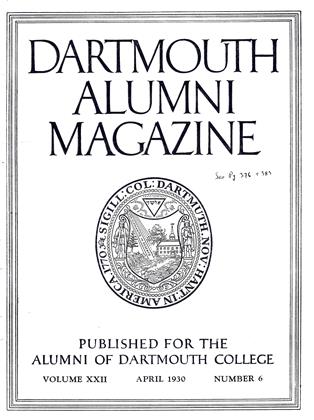COLLECTED PAPERS OP HERBERT DARLING FOSTER. Privately printed, 1929.
Great books such as the "Wealth of Nations" or "The Origin of Species" are usually the work of a lifetime. The five essays on Calvinism in this volume are parts of a magnum opus on "The Puritan and Calvinistic States" to which Professor Foster had devoted a lifetime of painstaking study. Had he finished the book it would hardly have had the epochal importance of the books mentioned above but there is every reason to believe it would have been a book of enduring value.
These essays are the products of a scholarly and unhurried mind. In a time when we are deluged with much that is superficial and ephemeral they are a tonic. Professor Foster once said to me, "The task of the historian is to teach vtie es gewesen ist" (how it happened). The outstanding trait of these essays is their Sachlichkeit or factuality. They bristle with facts, documented for the most part. Even secondary sources are carefully checked up with reference to primary sources. The more debatable the case he would establish, as in the chapter on International Calvinism where he tries to make John Locke out as a Calvinist, the harder is the rain of facts. One sometimes wishes the downpour would cease long enough to get a general view of the landscape. The first two essays, Geneva before Calvin and Calvin's Program for a Puritan State, are masterpieces of accuracy and thoroughness. In the second, which gives the bitter and prolonged quarrel of Calvin with the Councils, Professor Foster's sympathies are obviously with the ministers. It was really an impasse. The independent, pleasure-loving Genevese were unwilling to bow their necks to the stern theocratic bibliocracy of Calvin and one sympathizes with them. But it was the price they had to pay for an independent and efficient government. The first of these essays has been widely quoted and is almost indispensable to an understanding of the background of the Geneva of Calvin.
The last three essays, The Political Theories of Calvinists, Liberal Calvinism and International Calvinism, while scholarly and painstaking, are hardly up to the level of the first two, demanding as they do a wide acquaintance with many phases of theology, philosophy and the social, political and economic implications of Calvinism as well as a knowledge of factual details. The theologians would scarcely agree with the classification of Arminius and his followers at the Synod of Dort among the Calvinists. Both theologians and philosophers would object to putting Locke among the Calvinists. The "five points of political Calvinism" (p. 163) would include Paine, Rousseau and even Jefferson as well as Locke in the Calvinist fold. Troeltsch's monumental work Die Soziattehren der christlichen Kirchen undGruppen, the best discussion in any language of the social, international and economic phases of Calvinism, is not mentioned. At the time of his death Professor Foster was reading extensively on these wider phases of Calvinism and doubtless the book in its finished form would have presented a more perfect picture.
It is a matter of profound regret that Professor Poster was unable to digest all the large mass of material he had gathered and give us the sympathetic and scholarly interpretation of New England Calvinism we so much need. No other scholar was so well fitted as he to bridge the great gap in the cultural continuity of New England which separates this generation from its Puritan forbears.
The last two essays, "Webster's Seventh of March Speech" and "Webster and Choate in College" will be of special interest to Dartmouth men. The first of these has done much to rescue Dartmouth's most famous son from undeserved opprobrium. The essays are introduced by an Appreciation by Professor Anderson and a Preface by Professor Basye. The scholarly world, as well as all members of the Dartmouth family, will be grateful to those who have gathered these essays and put them into book form.
The Interfraternity Conference Year Bookfor 1929 contains a debate "The Alumnus . . . an asset or a liability" by C. E. Rhetts, Dartmouth '31 and Collier H. Young, Dartmouth '30, both members of the Sigma Alpha Epsilo fraternity.
 View Full Issue
View Full Issue
More From This Issue
-
 Lettter from the Editor
Lettter from the EditorEditorial Comment
April 1930 -
 Sports
SportsFootball at Dartmouth Since the War
April 1930 By Professor James P. Richardson -
 Article
ArticleThe Rough-and-Ready Eighties
April 1930 By William A. Bartlett '82 -
 Class Notes
Class NotesCLASS OF 1908
April 1930 By A. B. Rotch -
 Article
ArticleIntercollegiate Keys to Hospitality
April 1930 By Craig Thorn, Jr. -
 Class Notes
Class NotesCLASS OF 1901
April 1930 By Everett M. Stevens
John M. Mecklin
Books
-
 Books
BooksTHE FAMILY IN AMERICAN CULTURE,
January 1948 By ERVILLE B. WOODS. -
 Books
BooksBriefly Noted
JUNE 1970 By F.H. -
 Books
BooksPUBLICATIONS
January, 1923 By J.M.P. -
 Books
BooksPhiloprogenitive Bird
December 1975 By JOHN HURD '21 -
 Books
BooksMILITARISM, U.S.A.
OCTOBER 1970 By Louis Morton -
 Books
BooksJOB OPPORTUNITIES FOR YOUNG NEGROES.
FEBRUARY 1970 By RONALD N. TALLEY '69






